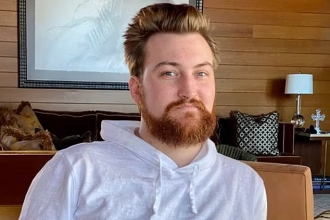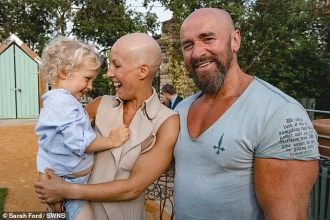Robert F Kennedy Junior has claimed that circumcision raises a child’s risk of being diagnosed with autism.
Speaking at today’s televised cabinet meeting, the Health and Human Services Secretary said: ‘There’s two studies which show children who are circumcised early have double the rate of autism. It’s highly likely because they were given Tylenol.
‘So, you know, none of this… is positive, but all of it is stuff that we should be paying attention to.’
These most recent comments follow a press conference last month in which the administration linked acetaminophen, brand name Tylenol, use during pregnancy to autism in children.
RFK Jr did not specify which studies he was referring to, but one of the only ones on the topic is a large 2015 paper on 340,000 boys that found those who were circumcised were 46 percent more likely to be diagnosed with autism than those who were not.
In this study, however, the researchers investigated the relationship between pain and autism, and made no mention of acetaminophen.
The Trump administration has vowed to get to the bottom of America’s high autism rate, which has surged from one in 1,000 children in the 1980s to one in 31 today.
Boys are about four to five times more likely to be diagnosed with the condition than girls, according to the latest estimates, with patients suffering from symptoms including developmental delays and speech problems.

Robert F Kennedy Junior is pictured above at today’s televised cabinet meeting where he made the claim
Your browser does not support iframes.
RFK Jr made the comments during the president’s hour-long cabinet meeting today, where Trump responded, saying the US should ‘pay attention to’ all potential causes of autism.
Research suggesting a link between autism and circumcision is observational, and does not prove that one causes the other. The apparent link could also be explained by other factors.
About 80 percent of men in the US are circumcised, estimates suggest, with many parents opting to get their children the operation because of religious beliefs or the belief that it is more hygienic and can help to prevent disease.
Circumcision tends to take place within a few days of birth, with guidance from hospitals, including Texas Children’s, saying it is safe to give a baby acetaminophen afterward to reduce pain.
The American Association of Pediatrics says that the benefits of circumcision outweigh the risks.
On September 22, President Trump urged pregnant women not to take acetaminophen because of potential links with autism, saying ‘don’t take Tylenol’, before adding, ‘fight like hell not to take it’.

Donald Trump is pictured at the press conference on September 22, where he told pregnant women not to take Tylenol, or acetaminophen
Some studies have shown an association between taking acetaminophen, the active drug in Tylenol, during pregnancy and autism in children.
But experts stress that an association does not directly prove that acetaminophen causes autism. They also highlight other large-scale research that has found no link between taking Tylenol during pregnancy and autism.
Tylenol is often used during pregnancy to bring down a high fever or reduce pain, which can also pose a risk to both mother and baby.
Dr Jeff Singer, a senior fellow at the Cato Institute in the Department of Health Policy Studies, told Daily Mail previously: ‘This is an issue, and it is being looked at by academic and clinical researchers around the world. It is not an unreasonable question to ask, “Does acetaminophen cause autism?”.
‘But what I am asking is that they leave the question to the scientists, to the clinical researchers, and stay out of it. We are on it, and we are already taking care of it.’
A day after the president made the claims, Dr Mehmet Oz, the director of Medicare and Medicaid Services, said it was not necessarily unsafe for pregnant women to take acetaminophen.


Shown above is Tylenol, which contains acetaminophen, which the administration has warned may raise the risk of someone being diagnosed with autism if taken during pregnancy
‘If you have a high fever… you ought to be talking to a doctor anyway,’ he said. ‘The doctor’s almost certainly going to prescribe you something. Tylenol might be one of the things they give.’
Vice President JD Vance said in an interview two days after Trump’s statement that pregnant women should follow the advice of their doctor.
He added that ‘ultimately, whether you should take something is very context-specific’ and should be considered ‘case by case’.
But Trump doubled-down on his advice on September 26, posting on his social media platform Truth Social: ‘Pregnant women, DON’T USE TYLENOL UNLESS ABSOLUTELY NECESSARY.
‘DON’T GIVE TYLENOL TO YOUR YOUNG CHILD FOR VIRTUALLY ANY REASON.’


















